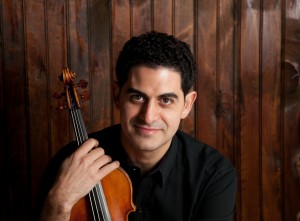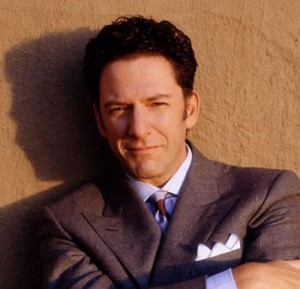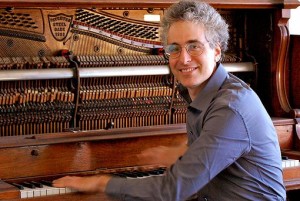MOAB MUSIC FESTIVAL, Sorrel River Ranch, Star Hall, Sept. 5-7
The Moab Music Festival closed this past weekend with a flurry of concerts that ranged from the antics of Gilbert and Sullivan to the upbeat jazz of the John Pizzarelli Quartet. In between, there were works ranging from the sublime to the fanciful by composers who are household names, as well as those who have yet to find a footing among American concertgoers.
Below are reviews of the concerts.
Sept. 5, Sorrel River Ranch, “Freedom and Censorship: The Music of Russia and Poland.”
The program was a well balanced look at how 19th and early 20th century composers’ music was affected by society and political upheaval. The program focused on Shostakovich, Mieczyslaw Weinberg and Rimsky-Korsakoff on the Russian/Soviet side, and Chopin and Grazyna Bacevicz across the border in Poland. It was an insightful glimpse into how these composers reacted to their immediate surroundings. Shostakovich, of course, is well known for seemingly bowing to political pressure to bring more socialist realism into his music, while trying to maintain his identity and integrity as an artist. But at times he could have a little fun, as the Five Pieces, for two violins and piano, showed. These are innocuous little pieces that nevertheless have a slight undertone of darkness to them. Weinberg, a younger contemporary of Shostakovich’s whose music has been woefully neglected in this country, also tried to maintain his dignity as a composer. The Moderato con moto movement from his Piano Quintet in F minor, op. 18, is an intense piece that exhibits a wide range of emotions and a depth of expression that only Shostakovich surpasses. It’s a gorgeously crafted piece that is expansive and subtle. Rimsky-Korsakoff’s Sextet for Strings in A minor, of which the final two movements were played, is an exuberant, carefree and peppy work that overflows with optimism and high spirits — the intellectual and emotional opposite of Shostakovich and Weinberg. Also on the program were selections from Chopin’s dazzling Préludes, op. 28, that run the gamut of technical wizardry and refined expressiveness, and the first two movements from Bacevicz’s spirited and rhythmically vibrant Piano Quintet No. 1 from 1952. Performing the concert were violinists LP How, Arnaud Sussmann and Ayano Ninomiya; violists Leslie Tomkins and Max Mandel; cellists Tanya Tomkins and Jeremy Turner; and pianists Pedja Muzijevic and Eric Zivian. The nine musicians enlivened the music with their spectacular playing that put their technical acumen and impressive musicality on display. Their readings were polished and brought depth and definition, as well as subtlety, to the music. It was chamber music of the highest order.
Sept. 6, Sorrel River Ranch, John Pizzarelli Quartet. John Pizzarelli is no stranger to Utah. He’s played gigs in Salt Lake City for years and Saturday he entertained the large audience under the tent at the Sorrel River Ranch with nearly 2 1/2 hours of witty banter, jazz classics, tunes from the Great American Songbook and a few more contemporary pieces — it was a broad selection of songs by George and Ira Gershwin and Duke Ellington to the Beatles. There were also a couple of pieces from his recently released album, Double Exposure. Pizzarelli is a fabulous guitarist who can dazzle his listeners with his virtuosity. And when he isn’t cutting loose, he can capture a mood with his sensitive and evocative playing. Pizzarelli is also a solid vocalist who knows how to fashion a song and make it his own. His bandmates — Konrad Paszkudski, piano, Martin Pizzarelli, bass, and Kevin Kanner, drums — are also amazing artists. This is a tight knit group who knows how to play off each other. It was a fun evening that ended all too soon.
Sept. 7, Star Hall, “There Will Always Be an England.” The closing concert was a tribute to late 19th and early 20th century English composers. It opened with settings by Benjamin Britten of three folk songs sung by tenor Robert Breault who was accompanied by guitarist Marc Teicholz. They gave a delightful account of these pieces. Breault brought lyricism and fluid lines to his singing and Teicholz brought refined musicality to his playing. It was also, unexpectedly, staged, with the two sitting at a cafe table and pretending to choose the songs they would do. They were followed by two instrumental works: the Phantasie Trio by Alice Verne-Bredt and the first movement from Arnold Bax’s Piano Quintet in G minor. Violinist Arnaud Sussmann, cellist Jeremy Turner and pianist Eric Zivian gave an effusive reading of the single movement trio that underscored the lyricism and charm of the music. For the quintet, Zivian was joined by violinists Ayano Ninomiya and LP How, violist Leslie Tomkins and cellist Tanya Tomkins. The music is quite energetic and forceful and the five gave a bold and impassioned reading that captured the spirit and drive of the music. They played with broad gestures and finely delineated phrasings that allowed the breadth and depth of the music to come through. And to close the program there was a splendid performance of Gilbert and Sullivan’s early one act operetta, Trial by Jury. For this staged performance,
Breault was joined by the members of the Lyric Opera Ensemble from the University of Utah, where he directs the opera program. Gilbert and Sullivan’s first big hit, Trial by Jury pokes fun at the judicial system as only these two can. The plot, revolving around a breach of promise of marriage is silly, and stage director Julie Wright-Costa, a colleague of Breault’s at the U., wisely played up the zaniness of the storyline; it was campy and fun. All of the leads gave commanding performances and sang and acted with conviction. Breault was wonderful as the Defendant, as was Jared Lesa as the Judge, David Sauer as the Counsel for the Plaintiff, Alyssa Jenks as the Usher and Makenzie Matthews as the Foreman of the Jury. But Shana Osterloh as the Plaintiff nearly stole the show — a difficult task given the overall high quality of the singing. Osterloh has a powerful voice that is also nicely modulated, and she brought subtle nuances to her portrayal. Also in featured roles were Jenny Erickson and Marilee Wilson as the two Bridesmaids. The large chorus was also exceptional. Breault and Wright-Costa can be proud of their students, who performed on a highly professional level. Accompanying the singers was a small band consisting of violinists Paul Woodiel and Robin Zeh, flutist Christopher Layer and pianist Jeffrey Price, also from the U. This was an absolutely delightful way to end the two-week-long festival.




